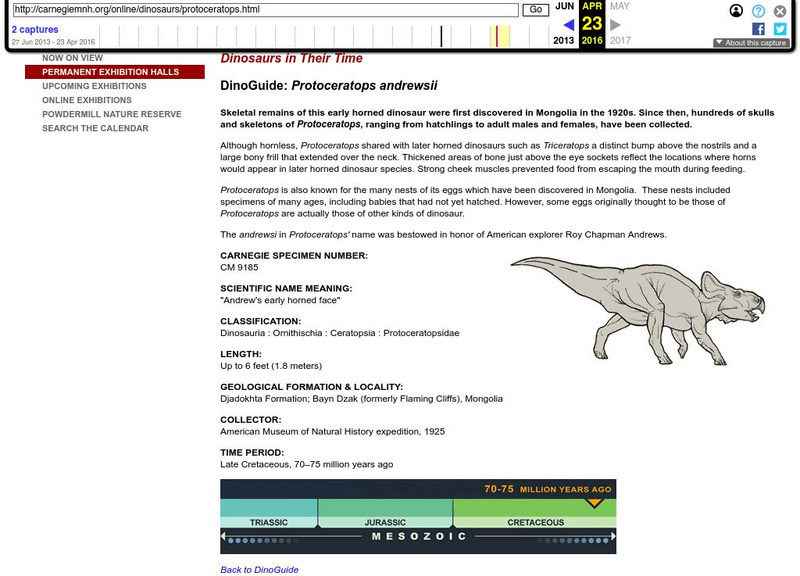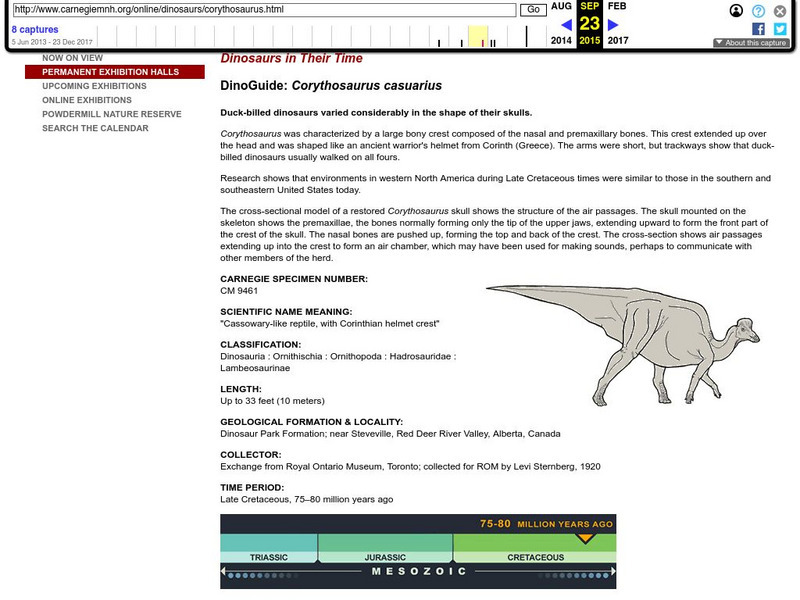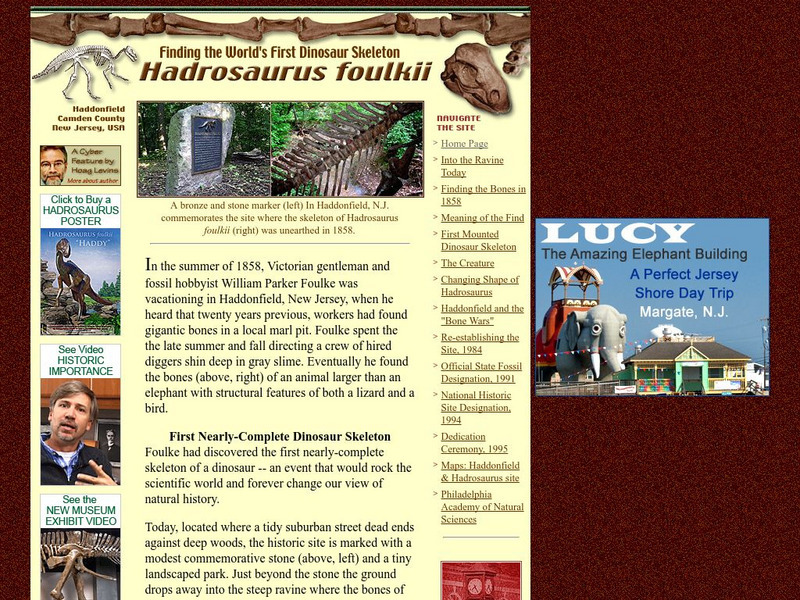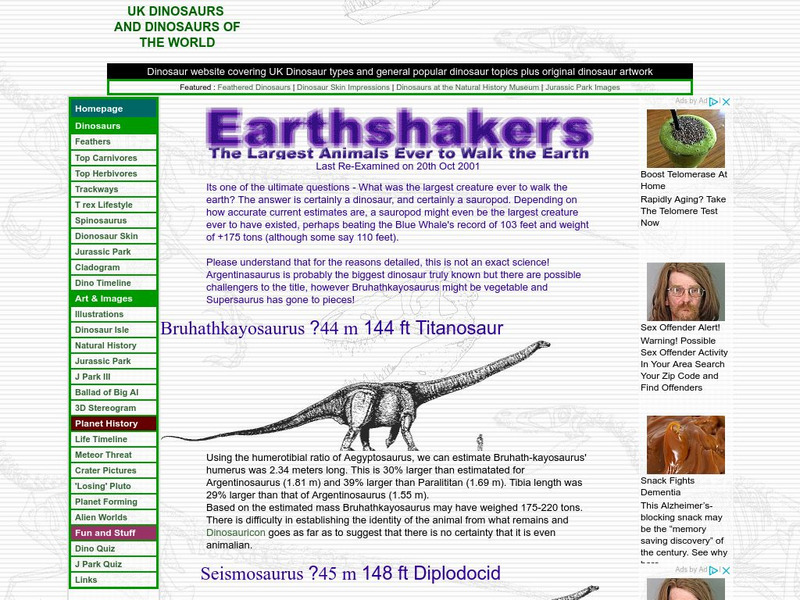Other
Travel Montana: Montana Kids: Maiasaur
The Maiasaur is a kind of hadrosaur, a dinosaur that lived in the Upper Cretaceous Period. Much of what is known about the Maiasaur came from the fossils found at Egg Mountain in Montana. Jack Horner, a well known paleontologist,...
Australian Broadcasting Corporation
Australian Broadcasting Corporation: Walking With Dinosaurs: Fact File: Plateosaurus
Plateosaurus was one of the first "giant dinosaur herbivores" and evolved during the Late Triassic period. Learn what fossils teach us about this dinosaur's size, diet, migration habits, and anatomy.
Australian Broadcasting Corporation
Australian Broadcasting Corporation: Walking With Dinosaurs: Fact File: Diplodocus
Diplodocus, a sauropod, "was the longest of the land animals" and its fossilized remains tell us much about its body type, weight, and diet. Read facts about this dinosaur and view several images showing what it looked like while alive.
Children's Museum
Dinosphere: Dino Profiles: Meet Dracorex Hogwartsia
Learn about a dinosaur whose name means "Dragon King of Hogwarts." From the fossils of the newly discovered Dracorex hogwartsia, we learn about the dinosaur's unique physical features.
Children's Museum
Dinosphere: Dino Profiles: Meet the Hypacrosaur Family
What is a Hypacrosaurus and how did they eat, live, and protect themselves against predators? Paleontologists have learned answers to these questions and others by looking Hypacrosaurus fossils. Read facts about this herbivorous...
Children's Museum
Dinosphere: Dino Profiles: Meet the Maiasaura
Read about paleontologist John Horner's 1978 discovery: a new dinosaur, the Maiasaura. Learn what this large creature's fossil tells us about the Maiasaura's diet and physical features. Click on "See the skeleton" for an interactive tour...
Children's Museum
Dinosphere: Dino Profiles: Meet Frannie the Prenoceratops
Learn what a fossil named "Frannie" can tells us about a herbivorous dinosaur called the Prenoceratops, a cousin of Triceratops. View a taxonomy table, learn about this dinosaur's physical features, and interact with skeleton to learn...
Carnegie Museum of Natural History
Carnegie Museum of Natural History: Carnegie's Dinosaurs: Dino Guide: Protocerato
This resource presents a brief overview of the Protoceratops.
Carnegie Museum of Natural History
Carnegie Museum of Natural History: Carnegie's Dinosaurs: Dino Guide: Corythosaur
Study a Corythosaurus up close with this concise resource from the Carnegie Museum of Natural History.
Australian Museum
Australian Museum: Plant Eating Dinosaurs Teeth
Some excellent photos of the teeth of herbivorous dinosaurs are presented.
Museums Victoria
Melbourne Museum: Meet the Skeletons: Tsintaosaurus Spinorhinus
Tsintaosaurus spinorhinus, a type of hadrosaur, was a herbivorous dinosaur from the Late Cretaceous Period. Its fossilized remains have been found in China. Some information and pictures can be found here.
Museums Victoria
Melbourne Museum: Meet the Skeletons: Protoceratops Andrewsi
Protoceratops andrewsi was an herbivorous dinosaur from the Late Cretaceous Period, related to the Triceratops. Some information and pictures can be found here.
Museums Victoria
Melbourne Museum: Meet the Skeletons: Mamenchisaurus Hochuanensis
Mamenchisaurus hochuanensis was an herbivorous Sauropod from the Late Jurassic Period, first discovered in China. Some information and pictures can be found here.
Museums Victoria
Melbourne Museum: Meet the Skeletons: Hypsilophodon Foxii
Hypsilophodon foxii was an herbivorous Ornithopod from the Early Cretaceous Period. Its fossilized remains have been found in England. Some information and pictures can be found here.
Museums Victoria
Melbourne Museum: Meet the Skeletons: Hadrosaur
The Hadrosaur was a herbivorous Ornithopod dinosaur from the Late Cretaceous Period. Its fossilized remains have been found in Canada and elsewhere. Some information and pictures can be found here.
Museums Victoria
Melbourne Museum: Meet the Skeletons: Talarurus Plicatospineus
Talarurus plicatospineus was an herbivorous ankylosaur from Mongolia that lived during the Late Cretaceous Period. Some information and pictures can be found here.
Museums Victoria
Melbourne Museum: Meet the Skeletons: Amargasaurus Cazaui
Amargasaurus cazaui was an herbivorous sauropod first found in Argentina. It lived during the Early Cretaceous Period. Some information and pictures can be found here.
Other
Hadrosaurus.com: Finding the World's First Dinosaur Skeleton:hadrosaurus Foulkii
Hadrosaurus foulkii was the very first dinosaur skeleton ever found. It was excavated in 1858 from a field in New Jersey. The story of the discovery, the excavation and the huge impact this had on the scientific world are described in...
Other
New Jersey Fossils: Duckbilled Dinosaur
The duckbilled dinosaur was a type of hadrosaurus and existed in New Jersey in the Late Cretaceous Period. A few fossil specimens have been found in areas of New Jersey, with the very first partial skeleton being discovered in...
Other
Dinosaur and Planetary History: Earthshakers the Largest Animals Ever
These herbivorous dinosaurs were the largest dinosaurs and, for some, the largest animals, ever to roam the Earth.
Australian Broadcasting Corporation
Australian Broadcasting Corporation: Walking With Dinosaurs: Fact File: Brachiosaurus
Brachiosaurus, "one of the biggest land animals ever", was a herbivorous dinosaur from the Late Jurassic period. Learn what fossils tells us about its anatomy, diet, size, and teeth. Also, see several images offering close-up views of...
Australian Broadcasting Corporation
Australian Broadcasting Corporation: Walking With Dinosaurs: Fact File: Muttaburrasaurus
A fact file on the dinosaur, Muttaburrasaurus, found in Australia.
Australian Broadcasting Corporation
Australian Broadcasting Corporation: Walking With Dinosaurs: Fact File: Leaellynasaura
An information page about the herbivorous dinosaur, Leaellynasaura.
Australian Broadcasting Corporation
Australian Broadcasting Corporation: Walking With Dinosaurs: Fact File: Polacanthus
An information page about the herbivorous dinosaur, Polacanthus.















